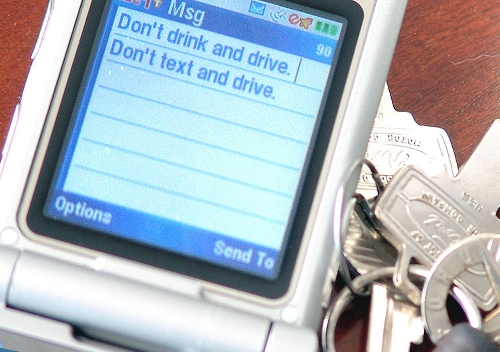Do we really need law to ban texting?
I've read a number of stories on the effects of texting while driving -- a story in People magazine immediately comes to mind -- and I was taken aback by just how huge and deadly a problem it has become, especially among tech-savvy and perhaps even tech-dependent teens.
Sadly and needlessly, many people have lost their lives because of this careless and selfish practice/habit.
The story in People delved into the guilt a teen boy felt after killing an elderly cyclist who was cruising along the highway. The teen had been sending a text message when he drifted outside his lane into the bike path, taking the life of the innocent man. This story made me think of the possibility of my own negligence in the past. I don't send or retrieve messages while the car is actually in motion. I have, however, typed and received text messages while waiting at stop signs and stoplights.
But do we really have to have a law for this? Shouldn't it just be common sense not to text and drive?
Well, the story in People made me reconsider even taking my phone out of my purse -- at all -- while driving.
To educate myself on the severity of this problem, I did some online research into collisions where text messaging is to blame. It's frightening and maddening all at the same time. Two Arizona women were killed when an 18-year-old girl drifted across the centerline into the oncoming lane while she was texting. A 17-year-old girl sent a couple of text messages and moments later crashed head-on into a truck, killing herself and four other girls who had graduated from high school just five days before.
In my opinion, texting is even more dangerous than talking on the cellphone while driving because sending a typed message requires the driver to concentrate on the keypad and take his or her eyes completely off the road and the traffic. It would be like reading a book or typing up emails while driving.
I've even read where texting while driving is deemed to be just as dangerous as drunk driving.
A while back, the American Automobile Association and Seventeen magazine joined forces for a poll of 1,000 16- and 17-year-old teens. Half -- that's 500 out of 1,000 -- of those who filled out the survey admitted they send text messages while driving. Scary. A University of Utah research report indicated that, while talking on the cellphone is dangerous, the chances of getting in a collision while texting and driving is 50 percent more likely than by talking on the phone while driving.
That study also revealed that nine out of 10 people believe text messaging while driving should be outlawed. What sane person wouldn't agree? But the better question, again, has to do with legislating common sense. Texting distracts from driving, so don't do it.
Going the extra mile, however, many jurisdictions have banned texting while driving.
It is believed that this issue is more dangerous among teenagers because of the obvious distraction caused by texting, coupled with a teen's inexperience behind the wheel. Worse yet is that text messaging is extremely popular with teens: It's how they communicate when they aren't face to face. A few of the teens interviewed in the stories I've read admitted that they are too excited to wait to retrieve an incoming text message. They feel compelled to open it immediately rather than waiting until they're out of the vehicle. It's a tragic error in judgment. Of course this excitement wouldn't be a problem if the cellphone was turned off and put away while driving like it should be.
Text messaging is not something that 40-year-olds grew up doing, and it is not as popular among older generations since it's not part of their culture or upbringing, which I think is the key here.
Most teens have cellphones and they send text messages during school classes and most other activities, unfortunately including driving. In the many stories reporting the statistics behind this problem, whether by coincidence, every accident was caused by teens.
So what can be done? Banning text messaging while driving is a start, but it's not the end, not by a long shot. School staff, if they're not already doing it, should talk about this issue with their students and it should be a fundamental "don't" that's intentionally brought up during driver training. But most importantly, parents should share the message of this column with their teens and encourage them to do the right thing and wait to send and receive messages until after arriving at their destination. Or better yet, leave the phone off.
Laws are one thing, but this is an education that needs to begin at home and in our schools.
Among her numerous accomplishments, Courtney Hansen is the author of her own book, the host of Spike TV's "Power Block," the former host of TLC's "Overhaulin'" and a writer with Wheelbase Media. You can email her by logging on to www.shiftweekly.com and using the contact form.














